Posted on October 29th, 2011 by ASEE
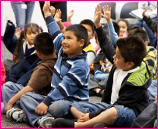 California officials and business leaders want to correct what they say is a failure to invest enough time, money and training to teach science well. Only 10% of elementary students regularly receive hands-on science lessons, a recent survey found. Just one-third of elementary teachers said they feel prepared to teach science, and 85% said they have not received any training during the last three years.
California officials and business leaders want to correct what they say is a failure to invest enough time, money and training to teach science well. Only 10% of elementary students regularly receive hands-on science lessons, a recent survey found. Just one-third of elementary teachers said they feel prepared to teach science, and 85% said they have not received any training during the last three years.
Read More
Filed under: K-12 Education News | Comments Off on Alarm Over Science Squeeze in California
Tags: Elementary Education, Research, Research on Learning, Science Education
Posted on August 30th, 2010 by Jaimie Schock
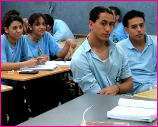 Young students are fascinated by science and very open to learning. But as they age, that interest and curiosity tends to wane — a fact too often reflected in test scores. In Texas, only 67 percent of students pass the science portion of the Texas Assessment of Knowledge and Skills exam, while 90 percent pass the English component.
Young students are fascinated by science and very open to learning. But as they age, that interest and curiosity tends to wane — a fact too often reflected in test scores. In Texas, only 67 percent of students pass the science portion of the Texas Assessment of Knowledge and Skills exam, while 90 percent pass the English component.
Read More
Filed under: K-12 Education News | Comments Off on Kids Love Science, Teens Less So
Tags: Research, Research on Learning, Science Education, Science Teachers, Teacher Training
Posted on May 17th, 2010 by Jaimie Schock
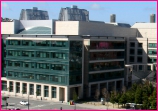 Science textbooks provide students with lots of useful facts, but science is not about spoon-fed answers. “Learning doesn’t work that way in the lab. You might start with a phenomenon that gets you wondering and leads to questions. We’re helping them (students) build critical thinking skills,” Rebecca Smith, co-director of the Science and Health Education Partnership.
Science textbooks provide students with lots of useful facts, but science is not about spoon-fed answers. “Learning doesn’t work that way in the lab. You might start with a phenomenon that gets you wondering and leads to questions. We’re helping them (students) build critical thinking skills,” Rebecca Smith, co-director of the Science and Health Education Partnership.
Read More
Filed under: K-12 Education News | Comments Off on University-Lab Partnership Aids Teachers
Tags: Education Policy, Science Education, Teacher Training
Posted on April 19th, 2010 by Jaimie Schock
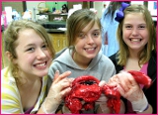 Is dissection essential to a high school biology class? That’s a question lawmakers in Connecticut are grappling with, according to the Hartford Courant. A bill heading to the state senate floor would allow students to opt out of dissections if they raise conscientious objections. Critics have long argued the procedure is outmoded and inhumane, while biology teachers have countered that it remains the most effective way to teach kids anatomy.
Is dissection essential to a high school biology class? That’s a question lawmakers in Connecticut are grappling with, according to the Hartford Courant. A bill heading to the state senate floor would allow students to opt out of dissections if they raise conscientious objections. Critics have long argued the procedure is outmoded and inhumane, while biology teachers have countered that it remains the most effective way to teach kids anatomy.
Read More
Filed under: K-12 Education News | Comments Off on Do Biology Students Need Dissection?
Tags: Biology, Education Policy, Public Policy, Science Education
Posted on April 5th, 2010 by Jaimie Schock
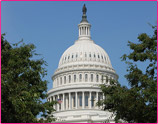 Congress has begun work on reauthorizing the Elementary and Secondary Education Act (ESEA), which became known as No Child Left Behind (NCLB) during the Bush years. The Department of Education’s “blueprint” for a new ESEA has largely won warm reviews from lawmakers in both parties. But, the American Institute of Physics (AIP) is unhappy that the proposal doesn’t put more emphasis on science education.
Congress has begun work on reauthorizing the Elementary and Secondary Education Act (ESEA), which became known as No Child Left Behind (NCLB) during the Bush years. The Department of Education’s “blueprint” for a new ESEA has largely won warm reviews from lawmakers in both parties. But, the American Institute of Physics (AIP) is unhappy that the proposal doesn’t put more emphasis on science education.
Read More
Filed under: K-12 Education News | Comments Off on Does ‘No Child’ Draft Shortchange Science?
Tags: Education Policy, Public Policy, Science Education
Posted on January 4th, 2010 by ASEE
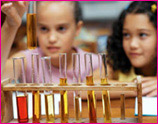 The 2010 Indiana Science Summit will be held Wed., Feb. 3, 2010 at the Eli Lilly and Company Corporate Headquarters in Indianapolis. The Science Summit will focus on the need for a system of sustained professional development to support inquiry-based science education and practical advice and methods for implementing research-based science curriculum.
The 2010 Indiana Science Summit will be held Wed., Feb. 3, 2010 at the Eli Lilly and Company Corporate Headquarters in Indianapolis. The Science Summit will focus on the need for a system of sustained professional development to support inquiry-based science education and practical advice and methods for implementing research-based science curriculum.
Read More
Filed under: For Teachers, K-12 Outreach Programs | Comments Off on Event: Science Summit, Feb. 3, 2010, Indianapolis, IND
Tags: Events, Indiana, Programs for Teachers, Science Education
 California officials and business leaders want to correct what they say is a failure to invest enough time, money and training to teach science well. Only 10% of elementary students regularly receive hands-on science lessons, a recent survey found. Just one-third of elementary teachers said they feel prepared to teach science, and 85% said they have not received any training during the last three years.
California officials and business leaders want to correct what they say is a failure to invest enough time, money and training to teach science well. Only 10% of elementary students regularly receive hands-on science lessons, a recent survey found. Just one-third of elementary teachers said they feel prepared to teach science, and 85% said they have not received any training during the last three years.








 Young students are fascinated by science and very open to learning. But as they age, that interest and curiosity tends to wane — a fact too often reflected in test scores. In Texas, only 67 percent of students pass the science portion of the Texas Assessment of Knowledge and Skills exam, while 90 percent pass the English component.
Young students are fascinated by science and very open to learning. But as they age, that interest and curiosity tends to wane — a fact too often reflected in test scores. In Texas, only 67 percent of students pass the science portion of the Texas Assessment of Knowledge and Skills exam, while 90 percent pass the English component. Science textbooks provide students with lots of useful facts, but science is not about spoon-fed answers. “Learning doesn’t work that way in the lab. You might start with a phenomenon that gets you wondering and leads to questions. We’re helping them (students) build critical thinking skills,” Rebecca Smith, co-director of the Science and Health Education Partnership.
Science textbooks provide students with lots of useful facts, but science is not about spoon-fed answers. “Learning doesn’t work that way in the lab. You might start with a phenomenon that gets you wondering and leads to questions. We’re helping them (students) build critical thinking skills,” Rebecca Smith, co-director of the Science and Health Education Partnership. Is dissection essential to a high school biology class? That’s a question lawmakers in Connecticut are grappling with, according to the Hartford Courant. A bill heading to the state senate floor would allow students to opt out of dissections if they raise conscientious objections. Critics have long argued the procedure is outmoded and inhumane, while biology teachers have countered that it remains the most effective way to teach kids anatomy.
Is dissection essential to a high school biology class? That’s a question lawmakers in Connecticut are grappling with, according to the Hartford Courant. A bill heading to the state senate floor would allow students to opt out of dissections if they raise conscientious objections. Critics have long argued the procedure is outmoded and inhumane, while biology teachers have countered that it remains the most effective way to teach kids anatomy. Congress has begun work on reauthorizing the Elementary and Secondary Education Act (ESEA), which became known as No Child Left Behind (NCLB) during the Bush years. The Department of Education’s “blueprint” for a new ESEA has largely won warm reviews from lawmakers in both parties. But, the American Institute of Physics (AIP) is unhappy that the proposal doesn’t put more emphasis on science education.
Congress has begun work on reauthorizing the Elementary and Secondary Education Act (ESEA), which became known as No Child Left Behind (NCLB) during the Bush years. The Department of Education’s “blueprint” for a new ESEA has largely won warm reviews from lawmakers in both parties. But, the American Institute of Physics (AIP) is unhappy that the proposal doesn’t put more emphasis on science education. The 2010 Indiana Science Summit will be held Wed., Feb. 3, 2010 at the Eli Lilly and Company Corporate Headquarters in Indianapolis. The Science Summit will focus on the need for a system of sustained professional development to support inquiry-based science education and practical advice and methods for implementing research-based science curriculum.
The 2010 Indiana Science Summit will be held Wed., Feb. 3, 2010 at the Eli Lilly and Company Corporate Headquarters in Indianapolis. The Science Summit will focus on the need for a system of sustained professional development to support inquiry-based science education and practical advice and methods for implementing research-based science curriculum.